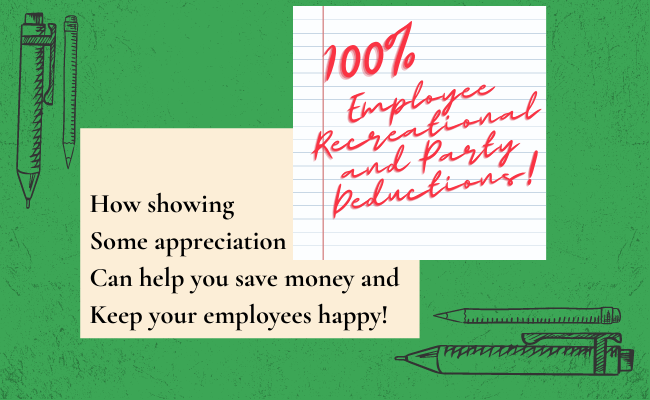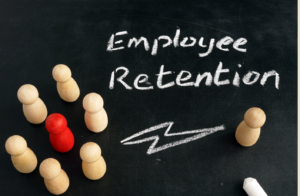How to get Deduct 100% of Your Employee Recreation and Parties
Employee deductions and how to make the best of them, for you and your employees
How to break down deductions for employees verse clients
You take your best client to the local country club or golf course and treat them to 18 holes of golf. The golf outing a zero deduction.
Verses this:
You take your employees and their spouses and children to the local country club, where they play golf and tennis; swim; and enjoy lunch, dinner, and snacks.
The cost of the country club meals and activity produces a 100 percent tax deduction.
- What does it take to qualify an employee party for the 100 percent deduction?
- What types of employee entertainment qualify for this 100 percent deduction?
- How tax law defines entertainment that’s primarily for the benefit of employees.
As we struggle through this pandemic, hiring and keeping employees has proved difficult. As a business owner dishing out raises to keep them may not be fiscally feasible. Below are some ways to accomplish this without breaking your bank. Lets face it, it’s not just your employees who are struggling.
Since we all know a happy employee is a long term employee. Making an employee feel welcome, appreciated and valued is one of the best ways to keep an employee.
Deduction for Employee Entertainment
The IRS says that the following types of entertainment qualify for the 100 percent employee entertainment tax deduction:
- Holiday parties, annual picnics, and summer outings
- Maintaining a swimming pool, baseball diamond, bowling alley, or golf course
The IRS makes it clear that the above are examples, and that other types of entertainment also qualify for the 100 percent deduction. The tax code states that “expenses for recreational, social, or similar activities (including facilities therefore) primarily for the benefit of employees” qualify for the 100 percent deduction.
In other words provide for your employees and it is a win, win.

Employees on a Powerboat
Here is how the tax court treated a case that’s broader in scope than one involving a holiday party or summer picnic.
During one tax year, a company rented a powerboat 41 times at a cost of $1,000 a day for daylong recreational cruises for its employees and their guests. (Seems excessive right?) The company had roughly 100 employees, but the boat would accommodate only about 30 people at a time.
All employees, including owners, managers, and rank-and-file personnel, were eligible to take these cruises, but they had to sign up in advance on a first-come, first-served basis.
The court allowed the full $41,000 deduction for the 41 cruises because the cruises
- were primarily for the employees,
- Did not discriminate in favor of the owners and highly compensated employees,
- were documented as to who cruised and when, and
- Passed the “ordinary and necessary” business purpose test.
So rent that day cruise and take your employees and their families for a spin, it is most likely less than giving them all raises (sorry employees) but it will make them appreciate it.
Who Are These Employees?
In this party section of the tax law, you (as an owner) belong to the “tainted group.”
Technically, the law requires that the entertainment expenses be primarily for the benefit of employees other than a tainted group, which consists of any of the following:
- A highly compensated employee (an employee who is paid more than $130,000 in 2021)
- Anyone (this likely includes you) who owns at least a 10 percent interest in your business, i.e., a “10 owner”
- Any member of the family of a 10 percent owner, i.e., brothers and sisters (including half-brothers and half-sisters); spouses; ancestors (parents, grandparents, etc.); and lineal descendants (children, grandchildren, etc., including adoptees)
Remember, as the business owner, you belong to the tainted group. That’s not a big deal. You just need to make sure that partying with the employees is primarily for the benefit of the employees.
So no off-shore fishing trips with your brother in law unless you open it up the opportunity to attend to your ‘rank and file’ employees
“Primary” Means “More Than 50 Percent”
In tax law, the words “primary” and “primarily” mean “more than 50%.” For employee recreation, that means the untainted group of employees has to have more than 50 % use of the entertainment facility—or in the case of a party, a majority of the attendees must come from the untainted employee group.
Something of note: I have said it many times in several articles, Document, Document Document! You can measure “primary” by days of use, time of use, number of employees, or any other reasonable method. However you measure -say it with me- documentation is key!

Not all deductions are created equal:
Easy-to-Meet Business Purpose Requirement
As you may remember, the Tax Cuts and Jobs Act eliminated deductions for business entertainment, but not for entertainment primarily for the benefit of employees, (Sorry, no client parties!)
You still need to satisfy the overriding standard for business expense deductions, which is the ordinary and necessary business purpose test. Thankfully for you, this test is easy to pass.
Basically, an ordinary and necessary expense simply means an expense that is “appropriate and helpful” for your business. To meet the test, the expense does not have to happen often or be a recurring expense.
What’s your ordinary and necessary reason for partying with your employees?
Your reasons might be as simple as improving employee morale and loyalty to your business. Or you may want to ensure that your business is more fun and has better working conditions than the competition has.
Like I said before and appreciated and valued employee is a happy one!
Documentation
You must document your 100 percent deductible employee entertainment expenses, just as you must document other expenses.
Something of note: When recording the expenses for an employee party, outing, or other type of entertainment, be sure to note your business reason for the entertainment.
- If it’s an annual event to improve employee morale and loyalty, write that down. ·
- If there’s a more specific reason, such as an office party to celebrate a fat new contract, write that down.
DOCUMENT, DOCUMENT, DOCUMENT!
Shameless plug: we specialize in keeping records, and making sure you are getting the most for business. Contact us at for more information.
 Bookkeepers corner: Chart of Accounts
Bookkeepers corner: Chart of Accounts
In your chart of accounts, make sure you have a category for the 100 percent deductible employee functions. This should also include a section for 100% meal deduction as well! See article more details. 100% deductible meals, what does that mean for you?
Without a category, you could mistakenly mis-categorize the expense, thus losing out of the full deduction.






